Libraries as Catalysts for Youth Empowerment: Insights from the 2024 Creating Youth Opportunities Convening
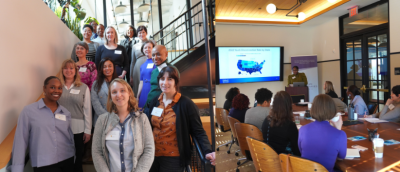
Written by Katie Sullivan, Senior Program Manager, Urban Libraries Council
On November 6-8, 2024, 11 leaders from public libraries across North America convened in Washington, D.C., for the 2024 convening of ULC’s Creating Youth Opportunities (CYO) initiative. With a dynamic mix of presentations, panels, and discussions, the convening showcased innovative strategies to improve outcomes for opportunity youth—young people disengaged from both work and school and navigating systemic barriers to education and employment.
Several key themes emerged that may be supportive to libraries exploring this work nationwide:
1. Libraries should create opportunities for young people to build their social capital.
One of the convening highlights was a presentation by Drew Johnston, a Research Collaborator at Opportunity Insights and Postdoctoral Research Scientist at Meta. Johnston unveiled research on how social networks shape economic opportunities. Among the findings in Opportunity Insights’ research are indications that “children who grow up in communities with more cross-class interaction are much more likely to rise out of poverty.” Libraries, as community hubs, have the potential to foster these connections, amplifying youth access to critical resources. Libraries can pursue programming such as cross-social class events and mentoring opportunities for youth, and college visits.
2. Libraries should give young people a voice in designing youth programs.
Arienne Jones, Senior Program Manager for Justice and Equity at the Aspen Institute Forum for Community Solutions shared insights on engaging opportunity youth, offering attendees actionable strategies to integrate equity and inclusivity into programming.
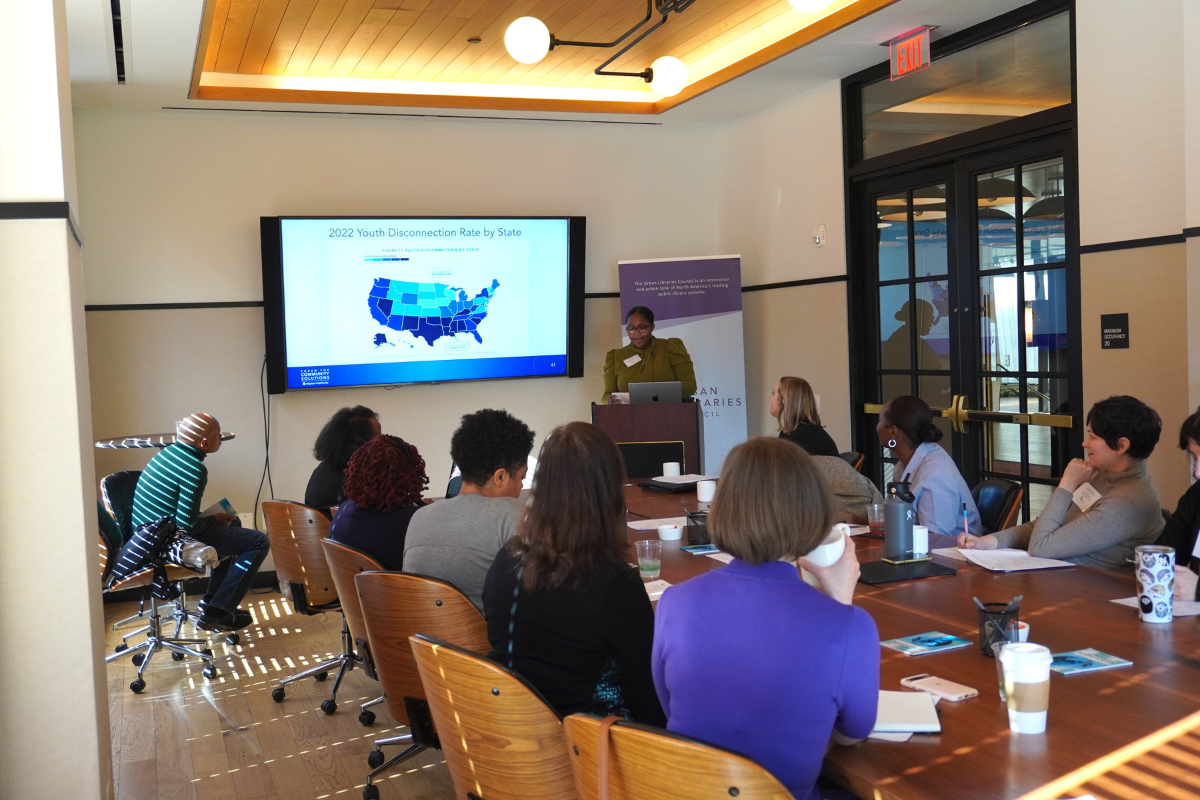
“Youth have the right to represent their own interests and the expertise to play decision-making roles,” said Jones. The Forum for Community Solutions’ framework posits that authentic youth engagement leads to youth-serving systems and programs that are better informed, more effective, and more equitable. Jones encouraged library staff to ask themselves what opportunities they have for young leaders to provide input and feedback into their program design.
At the event, library staff also had the opportunity to hear from three teen speakers on their lived experiences, which offered a firsthand look at the challenges and triumphs opportunity youth face. In their spaces, libraries can explore youth empowerment opportunities such as teen advisory councils and teen leadership opportunities in programs.
3. Libraries should strive to provide holistic supports that can put youth on the path to living wage employment.
Dr. Mary Ann Haley, Executive Director of the National Youth Employment Coalition, highlighted the importance of pathways to meaningful employment opportunities for marginalized youth. Haley encouraged library staff to make observations about their program participants, including: 1) Are they safe? 2) Do they have housing? And 3) Are there any other signs of distress? Library staff should be informed about local resources they can connect youth to, including housing, transportation, childcare, and mental health supports. Libraries should build relationships with public sector and non-profit partners who provide these services, and be ready to connect youth with them. The basic needs of youth must be met before they can be expected to thrive in school or employment.
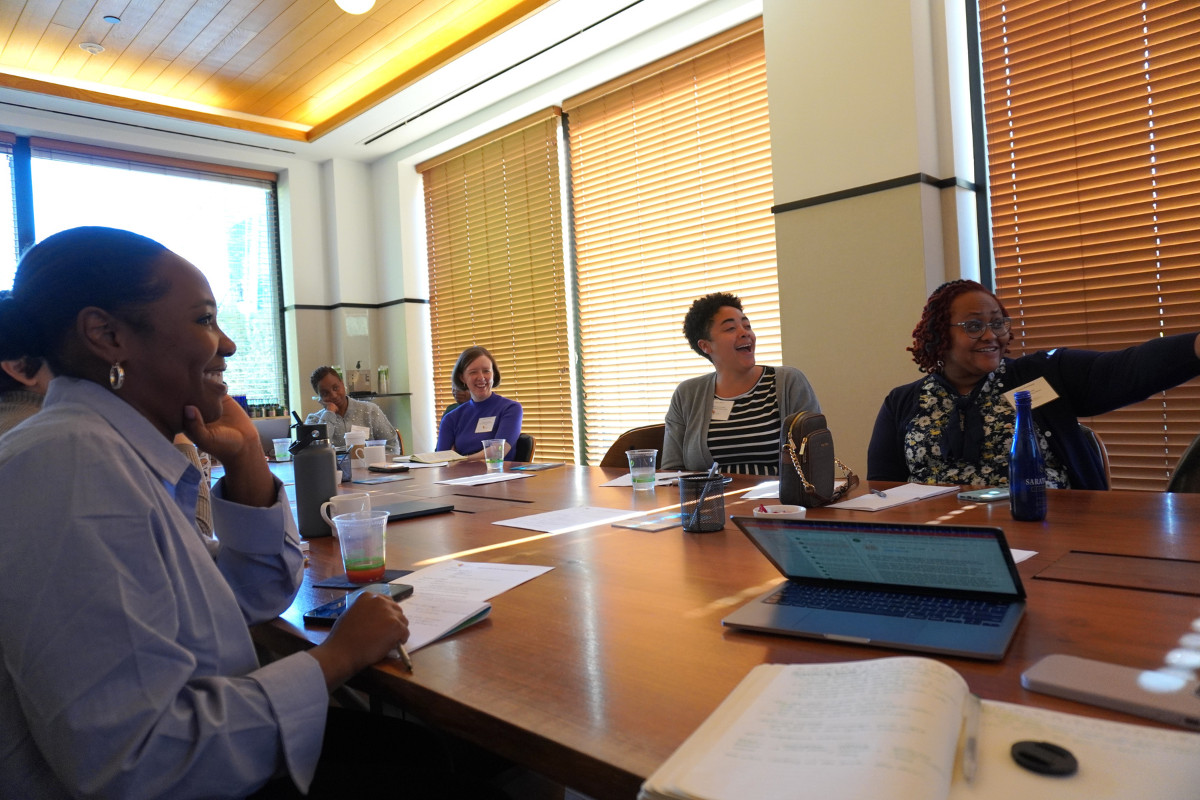
4. Libraries should maintain long-term, authentic connections with youth.
Sarah Hemminger, Co-Founder and CEO of Thread, shared her organization’s approach to building relationships, forming a deeply woven extended network of care and support for young people. Now in its 20th year, Thread emphasizes both the quality and quantity of connection, matching each young person with a group of caring adult volunteers from diverse backgrounds and experiences who join one another on their personal journeys. Thread leverages its powerful network of resources to help young people and volunteers overcome barriers and achieve their goals, and makes a unique 10-year commitment to every young person it enrolls.
According to the organization’s most recent strategic plan, Thread has shown how building relationships across lines of difference, in a way that makes each individual feel seen, known, loved and profoundly aware of our interconnectedness, can lead to strong educational outcomes.” Libraries can work to maintain long-term connections with youth by planning regular check-ins and touchpoints with youth program participants.
This year’s convening reaffirmed the power of libraries to drive systemic change. With strategic programming efforts, libraries can position themselves as essential participants in building equitable, thriving communities that empower young people.
Related Articles
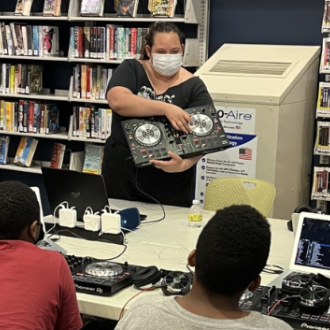
Libraries Overcome Barriers and Identify Opportunities for Service to Youth
Through ULC’s Creating Youth Opportunities Initiative, 11 libraries participated in a peer-learning cohort and developed individualized program plans to specifically reach opportunity youth — those defined as young people between the ages of 16 to 24 years old who are disconnected from both school and work, frequently face challenging home or community environments.
Read More
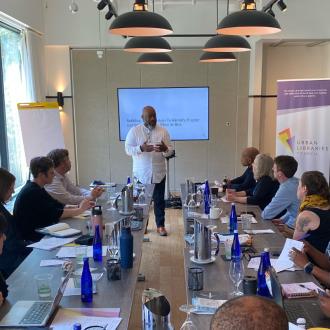
Libraries Build Tailored Program Plans to Improve Youth Outcomes
Eleven representatives from leading libraries gathered in Washington, D.C. from May 31 to June 2, 2023, for a convening focused on developing program plans that will effectively serve opportunity youth. Opportunity youth are at the highest risk of involvement with the criminal justice system.
